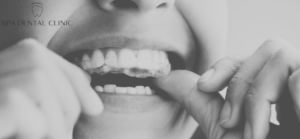What type of veneers are right for me?
Choosing the most appropriate veneers can feel a little daunting, but at Spa Dental, we can assist you to make it easier. This blog will go through some of the factors to consider when selecting which type of veneer is best suited to you.
Veneers are a fantastic technique to make your teeth stand out by hiding any flaws you may have. Veneers aid in the correction of crooked, yellowed, or discoloured teeth and help your teeth appear straighter, whiter, and healthier.
Read on to find out which veneers are going to be best for you.
What are veneers?
Veneers are a type of dental restoration that is used to improve the appearance of teeth. They are made from thin pieces of porcelain or resin and are bonded to the front of the teeth.
It’s worth noting that, once they have been aligned to your teeth, veneers are irreversible. After that point, removal is no longer an option.
What types of veneers do we offer?
The four varieties of veneers that we provide to our patients at Spa Dental are EMAX veneers, feldspathic veneers, composite veneers, and porcelain veneers.
EMAX Veneers
A less invasive ceramic dental veneer that can be used in thinner areas and only requires tooth extraction in some cases.
Feldspathic Veneers
A form of dental veneering constructed of a glass-like ceramic called feldspar. They’re created by applying several very thin layers of porcelain to an existing tooth structure and then baking it in an oven.
Composite Veneers
Created using a tooth-coloured resin which is applied and sculpted directly onto the teeth.
Porcelain Veneers
Thin pieces of porcelain used to improve the appearance of teeth that have been damaged by tooth decay or chipped.
What are the advantages of having veneers?
There are many advantages to having dental veneers. Some of the most common reasons people choose to get veneers are because they want a whiter smile, they have crooked teeth, or they have gaps between their teeth. Some more advantages of choosing to have veneers are:
- They improve your teeth’s cosmetic appearance and transform your look.
- Veneers protect the underlying tooth from deterioration.
- Porcelain veneers are more stain-resistant than natural teeth.
- There are a number of non-invasive and no-prep options for you to consider.
What are the disadvantages of having veneers?
- Veneers are permanent once they have been bonded to your teeth; removal is no longer an option after that.
- Veneers can cause tooth sensitivity, so you may feel discomfort from hot or cold meals and beverages after the procedure.
- If you eat hard foods or grind your teeth frequently, veneers may fracture, chip, or break off.
- Veneers are fairly pricey, so if you are on a restrictive budget you may need to opt for a cheaper alternative.
Hopefully this blog will give you some ideas about which veneer option is the right one for you.
However, if you are still undecided, then either fill in our contact form here or call us on 01905 773 111 to book your free consultation today and we can help you make the right choice for you.


